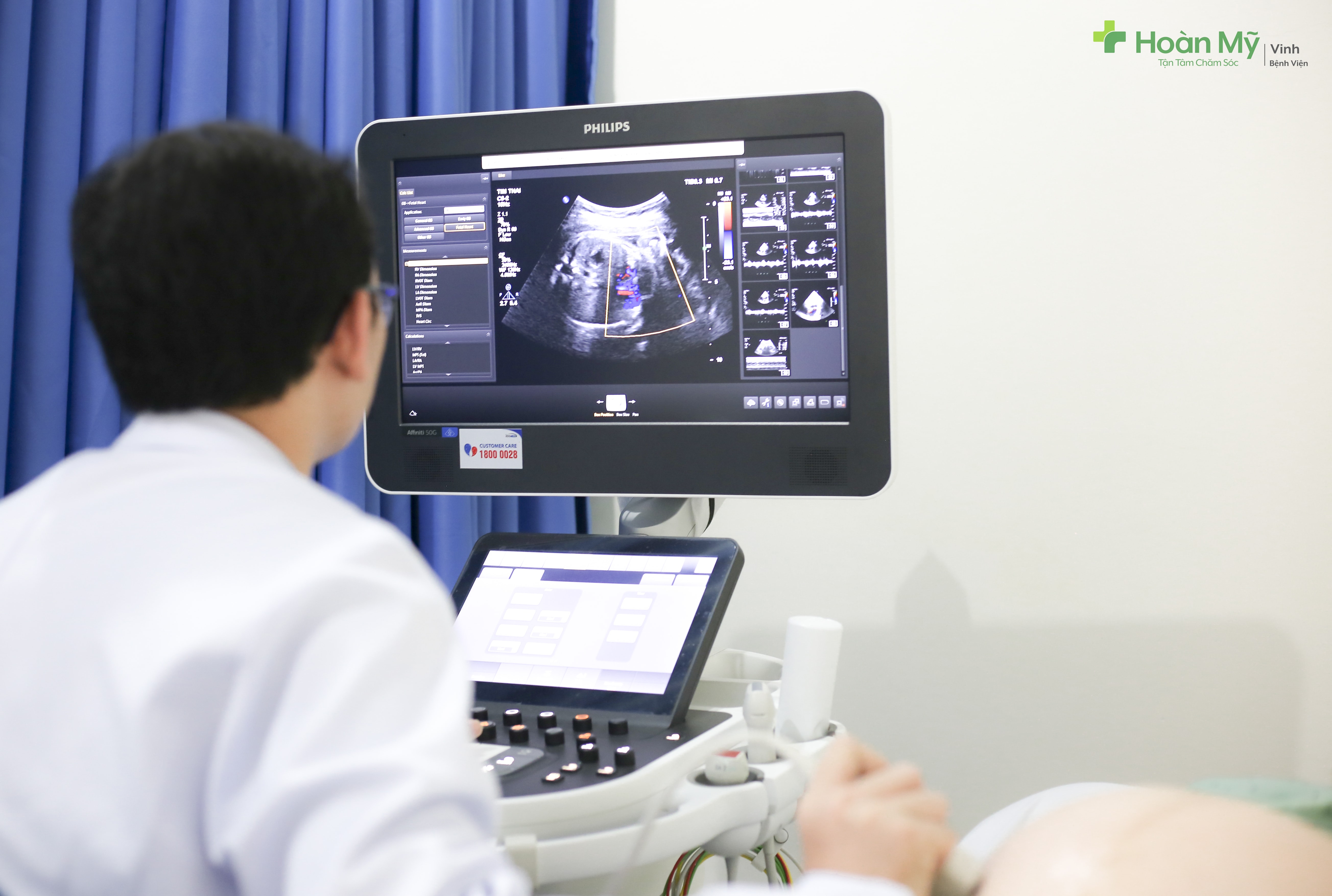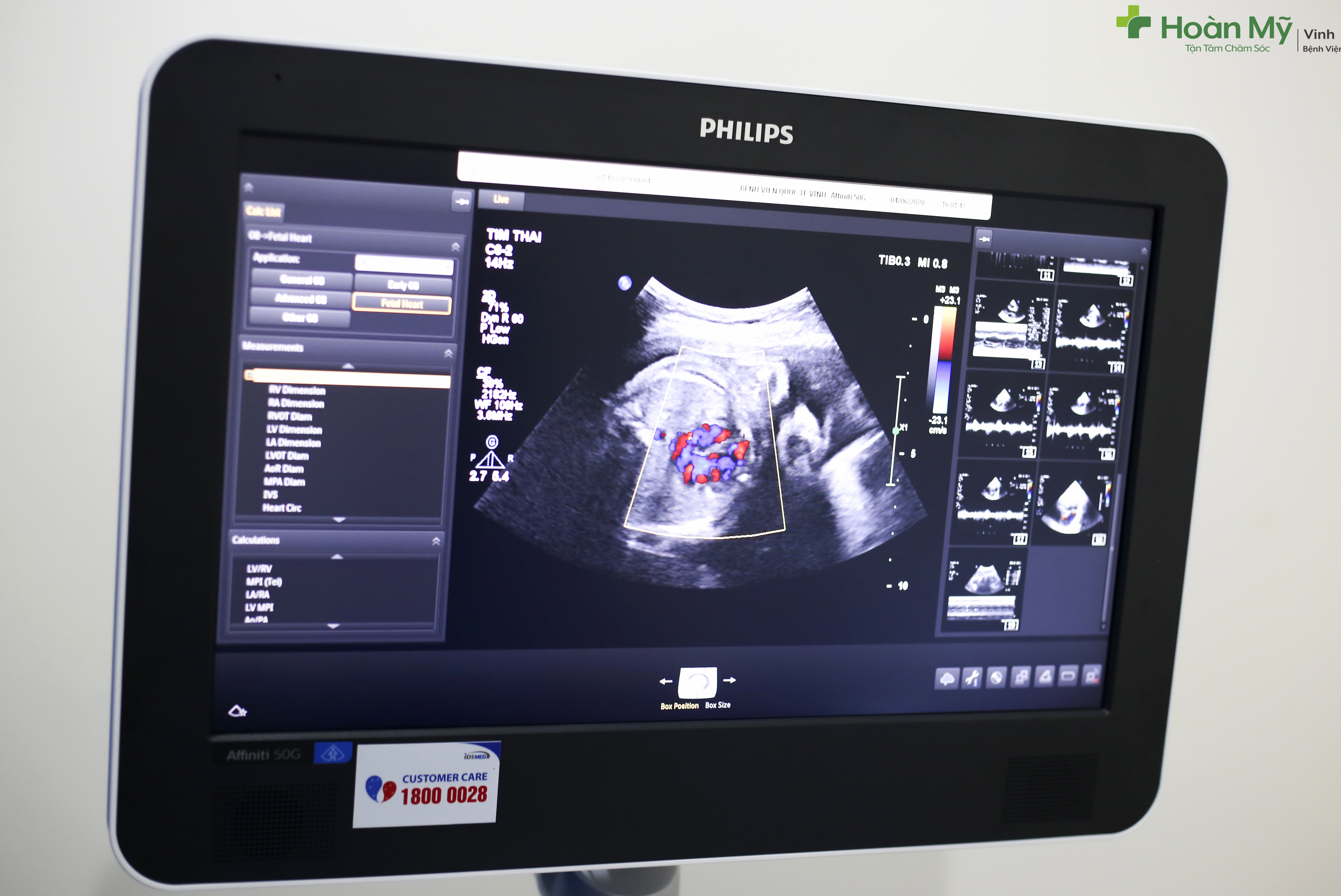Vinh International Hospital launches new service: Ultrasound screening for fetal congenital heart disease
(Baonghean.vn) - Congenital heart disease is an abnormality of the heart structure or large blood vessels in the chest; one of the common birth defects (accounting for 8-10/1000 children) and is the leading cause of death in newborns, accounting for nearly 40% of newborn deaths due to birth defects. Therefore, early detection of the disease helps reduce mortality as well as the burden of disease.
 |
| Vinh International Hospital has launched a fetal congenital heart ultrasound screening service, supporting early diagnosis and treatment of congenital heart diseases in children. Photo: Kim Chung |
Causes of congenital heart disease in children
According to research, congenital heart disease in children is caused by a number of reasons:
Hereditary:Children whose parents or relatives have congenital heart disease are at higher risk of developing the disease. If the parents carry the gene, even if they do not have congenital heart disease, their children are still at high risk of developing the disease.
Environmental factors:During pregnancy, if the mother uses certain medications without a doctor's prescription, or uses stimulants (alcohol, beer, etc.), the child is likely to be born with congenital heart defects. In addition, if the mother is exposed to X-rays, radioactive substances, chemicals, etc., or lives in other toxic environments, it can also affect the formation of organs, especially the heart and blood vessels, leading to congenital defects in the child.
Mothers infected with Herpes, Rubella, Cytomegalovirus, etc. during the first 3 months of pregnancy will make their children susceptible to birth defects, especially congenital heart disease. Mothers with diabetes or lupus erythematosus during pregnancy can also lead to dangerous complications, putting their children at risk of congenital heart defects.
Why should we have ultrasound screening for congenital heart disease in the fetus?
Nowadays, with the development of science and medicine, doctors can detect congenital heart defects in children right from the fetus by ultrasound. Fetal echocardiography is a safe and effective technique in the early detection of heart defects. Although at this stage, the fetal heart is a very small structure, changing position according to the baby's position in the mother's womb.
According to Master, Doctor Nguyen Dinh Van -Department of Internal Medicine, Vinh International Hospital,Fetal echocardiography helps doctors assess the cardiovascular status of the fetus such as: heart rate, structure and function of the fetal heart. Fetal echocardiography is essential in assessing cardiovascular problems in the fetus: Helps detect early cardiovascular abnormalities before birth; Supports prenatal diagnosis and treatment; Supports families in preparing and planning to welcome new members; Terminate pregnancies for severe heart defects. Thereby, helping to significantly reduce the mortality rate in newborns.
Fetal echocardiography can detect common diseases such as: Ventricular septal defect, hypoplastic left heart syndrome, atrioventricular canal, coarctation of the aorta, tricuspid valve atresia, tetralogy of Fallot, truncus arteriosus, transposition of the great arteries, pulmonary valve atresia with open interventricular septum, double-inlet right ventricle, double-outlet right ventricle, Ebstein's anomaly...
 |
| Fetal echocardiography is essential in assessing cardiovascular problems in the fetus, helping to significantly reduce the mortality rate in newborns. Photo: Kim Chung |
When should fetal congenital heart ultrasound screening be performed?
“Pregnant women need to be examined as well asfetal echocardiographyat least once during your pregnancy to screen for heart abnormalities.18th - 22nd week of pregnancyis the “golden time” for ultrasound diagnosis of congenital heart defects. After the 30th week of pregnancy, due to the increased ratio of fetal body mass and amniotic fluid, it is more difficult to obtain images.
Up to 80% of fetuses born with congenital heart disease have no previous risk factors. Therefore, fetal echocardiography is recommended for all pregnant women, especially those in the high-risk group" -Master, Doctor Nguyen Dinh Van added.
To know exactly whether the fetus has congenital heart disease or not, the ultrasound process must be performed by doctors who have specialized training in cardiology, pediatric cardiology, vascular intervention and fetal echocardiography; helping to assess the cardiovascular condition of the fetus such as heart rate, structure and function of the heart.
In Nghe An, ultrasoundWhere to screen for fetal congenital heart disease?
Currently, Vinh International Hospital has launched a new service - ultrasound screening for congenital heart disease in fetuses with the aim of supporting early diagnosis and treatment of congenital heart disease in children while still in the womb.
The hospital is equipped with an advanced ultrasound system with a variety of probes that can perform cardiac, fetal and vascular ultrasound. The ultrasound machine line is from Phillips, providing clear images, operating in 2D and 2D/CFI/TDI mixed mode at over 1,400 frames per second.
With a team of highly specialized doctors, with extensive experience in the field of echocardiography and congenital heart intervention consultation, Vinh International Hospital is a trusted address for pregnant women to entrust their trust in prenatal examination and screening.
To learn more about the service, please contact: 02383.968.888


